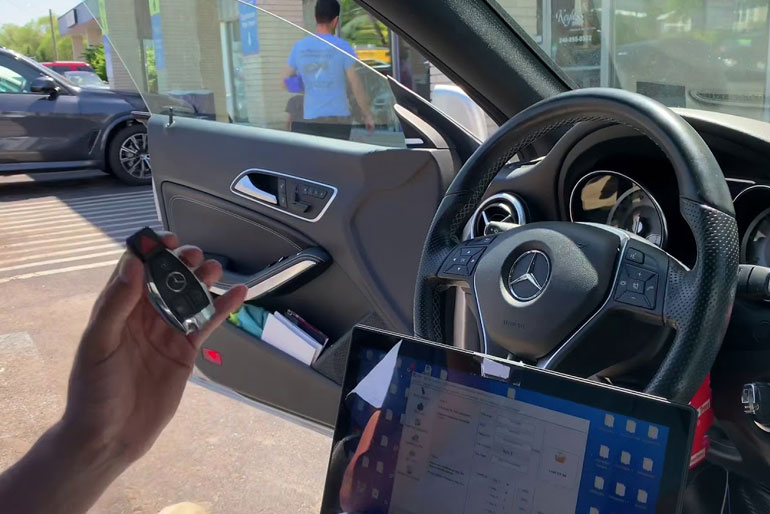As a vehicle owner, it’s essential to be proactive about the security of your automobile. One of the best ways to ensure this is by using a GPS tracker for your car. GPS, or Global Positioning System, trackers are devices that utilize satellite signals to track the location of vehicles accurately. They have become an indispensable tool for companies managing fleets and personal vehicle owners who want to keep an eye on their cars’ whereabouts.
These devices come with various features and benefits that make them an excellent addition to any vehicle. This article will explore everything you need to know about GPS trackers for cars, including how they work, the benefits of using them, and factors to consider when choosing one. We’ll also cover some of the top car trackers available in the market and discuss the legal considerations to keep in mind when using these devices.
Understanding How A GPS Tracker For Cars Works?
A GPS tracker for cars operates using a simple yet efficient GPS system. The device utilizes GPS satellites to determine the exact location of your car. It then transmits this information via a cellular network to a server or your smartphone, giving you real-time data on your vehicle’s location.
The accuracy of a GPS tracker depends on the number of satellites it can connect with. Most trackers connect to at least three satellites to provide an accurate location. This method, known as trilateration, involves the satellites sending signals that intersect at a specific point on the earth’s surface, which is your car’s location.
Some advanced GPS trackers for cars also come with additional features such as geofencing, which allows you to set boundaries for your vehicle. If the car moves outside these boundaries, the device will send you an alert. Other features include real-time tracking, historical route playback, and speed alerts.
Benefits Of Using A GPS Tracker For Your Car
Investing in a GPS tracker for your car comes with several benefits. One of the most significant advantages is the enhanced security it offers. With a GPS tracker, you can keep tabs on your vehicle’s movement and location, giving you peace of mind even when you’re not near your car.
Another benefit of using a tracker for cars is the ability to monitor driving habits. This feature is particularly beneficial for parents with teenage drivers or businesses managing a fleet of vehicles. You can monitor speed, braking habits, and route choices, which can help improve driving habits and efficiency.
Lastly, a car tracking devices can help in the quick recovery of stolen vehicles. The real-time tracking feature allows you to trace your car’s location and provide this information to the authorities, increasing the chances of recovering your vehicle.
Features To Look For In The Best GPS Car Trackers
When choosing a GPS tracker for your car, there are several features to consider. First, consider the accuracy of the device. The best car tracking device should provide real-time tracking with pinpoint accuracy. This ensures that you always know the exact location of your vehicle.
Secondly, consider the battery life of the GPS tracking device. If you’re using a battery-powered tracker, it should have a long battery life for continuous tracking. Some trackers also come with a feature that alerts you when the battery is low.
Other features to look for in the best tracking device for car include geofencing, speed alerts, and historical route playback. These features provide additional security and convenience for the user.
Comparing Different Types Of GPS Tracking Devices
There are several types of GPS trackers for cars available in the market. These include hardwired trackers, plug-in trackers, and battery-operated trackers. Hardwired trackers are installed directly into your car’s electrical system, providing continuous tracking. They are a great choice for businesses managing large fleets.
Plug-in trackers, on the other hand, are easy to install and remove. They plug directly into your car’s OBD-II port and provide real-time tracking data. Battery-operated trackers are portable and can be placed anywhere in the car. They are a great choice for personal vehicle owners who want a flexible tracking solution.
Each type of tracker has its pros and cons, and the best one for you will depend on your specific needs and preferences.
How To Choose The Best Tracking Device For Your Car
When choosing the best tracking device for your car, there are several factors to consider. First, consider the type of tracker that best suits your needs. Do you want a hardwired tracker, a plug-in tracker, or a battery-operated tracker?
Next, consider the features offered by the device. Does it offer real-time tracking, geofencing, and speed alerts? The more features, the better, as they provide added security and convenience.
Lastly, consider the cost of the tracker and the associated subscription fees. Some GPS tracking devices for cars require a monthly subscription to access the tracking data. Make sure to factor in this cost when choosing your tracker.
Top Car Trackers And GPS Tracking Devices On The Market
There are several top-notch car trackers and GPS tracking devices on the market. Some of the best include:
- Family1st Portable GPS Tracker: This is a compact and portable tracker that offers real-time tracking and geofencing. It has a long battery life and comes with a monthly subscription plan.
- MOTOsafety OBD GPS Tracker: This plug-in tracker offers real-time tracking, geofencing, and driving habit monitoring. It’s a great choice for parents with teenage drivers.
- Vyncs GPS Tracker: This hardwired tracker offers real-time tracking, geofencing, and vehicle diagnostics. It’s a great choice for businesses managing a fleet of vehicles.
Each of these trackers offers a unique set of features and benefits, making them excellent choices for different types of users. A more extensive list of car GPS trackers can be found in the blogs of Familys1st.
Installing And Using A GPS Tracking Device In Your Car
Installing a GPS tracking device in your car is a straightforward process. If you’re using a plug-in or battery-operated tracker, simply plug it into the OBD-II port or place it in a discreet location in your car. Hardwired trackers require professional installation.
Using a GPS tracker for cars is also simple. Most trackers come with a companion app that you can download on your smartphone. This app allows you to monitor your car’s location and access other features such as geofencing and speed alerts.
Legal Considerations When Using A Car Tracker Device
When using a car tracker device, it’s essential to be aware of the legal considerations. In most regions, it’s legal to install a GPS tracker in your own car for security purposes. However, installing a tracker in someone else’s car without their consent is generally considered illegal.
If you’re a business owner using trackers for cars in your fleet, make sure to inform your employees about the trackers. Transparency is key to maintaining trust and avoiding legal issues.
Final Words
Choosing the best GPS tracker for your car’s needs is a decision that requires careful consideration. From understanding how these devices work to comparing different types and considering the various features, there’s a lot to take into account. However, the peace of mind and enhanced security that a car tracker device provides make it a worthwhile investment.
Remember, the best car tracking device is one that meets your specific needs and preferences. Whether you’re a parent looking to monitor your teenage driver, a business owner managing a fleet, or simply a car owner wanting to enhance your vehicle’s security, there’s a GPS tracker out there for you.
And now that you’re equipped with all the necessary information, it’s time to choose the best GPS tracker for your car and enjoy the peace of mind that comes with knowing your car is secure and traceable at all times.






